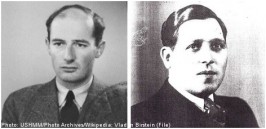A new book containing statements from a cellmate of missing Swedish diplomat Raoul Wallenberg proves that Russian officials deliberately withheld information about the fate of the man credited with saving thousands of Jews from the Holocaust, researchers allege.
“They’ve been caught red handed,” historian Susanne Berger told The Local of the Russian actions.
“This ranks as one of the most significant findings in the Raoul Wallenberg case in the last 50 years.”
The new accusations of Russian deception regarding what happened to Wallenberg come following the publication of a new book, “Secrets of the Third Reich Diplomacy,” which contains interrogation transcripts from several German diplomats imprisoned by the Soviet Union following World War II, including Willy Rödel, who was Wallenberg’s long-term cellmate in Moscow’s Lefortovo prison from 1945-1947.
The book was published earlier this year by archivists of Russia‘s Federal Security Service (FSB)— the successor to the KGB.
Historian Vadim Birstein, a Russian-born researcher now based in the United States, who along with Berger served on the 1991 Swedish-Russian Working Group tasked with looking into Wallenberg’s disappearance, came across the book while researching SMERSH, the Soviet military counterintelligence active during the second part of World War II.
“I was very surprised to find Russian translations of two statements written by Rödel in the new book compiled by the FSB archivists,” Birstein told The Local.
“For years the FSB central archive wrote to Susanne Berger and me claiming that Rödel’s investigation file did not exist.”
According to Berger and Birstein, the emergence of the statements made by Wallenberg’s cellmate mark a significant turning point in the quest to learn the truth about Wallenberg’s time in Soviet custody.
”There is a fundamental difference now,” said Berger.
“We can prove the deception…they’ve lied.”
Wallenberg, who managed to rescue tens of thousands of Jews destined for death camps while working as a Swedish diplomat in Budapest during the Soviet occupation of the Hungarian capital, went missing after his arrest by Soviet forces in Hungary on January 17, 1945.
Soviet and later Russian officials have long claimed the Swede died in Soviet custody on July 17, 1947, but family members and experts have long doubted the official Soviet version of his death.
While the statements by Rödel included in the book date from before the time he shared a cell with Wallenberg, they come from the same 549-page file which contained other information about Rödel, portions of which were released to the Swedish-Russian Working Group in 1993.
Previously, the researchers were told by Russian officials that the pages they had received from the file were numbered 543-549, making Rödel’s the last case detailed in the file.
However, Rödel’s newly released statements carry the page numbers 477-484, leading Berger and Birstein to conclude there may be 57 more pages of material that the Russians have previously claimed did not exist and which has yet to be released to researchers.
“If the early statements made by Willy Rödel in Soviet imprisonment survived even though Russian officials have told us adamantly for two decades that they did not, we cannot help but wonder if Rödel’s interrogations dating from the time he was held together with Raoul Wallenberg also continue to exist,” Berger and Birstein said in a statement released on Monday.
“Perhaps then this is the real reason why we have not been allowed to review the 57 still secret pages in this material?”
The latest revelation comes slightly more than a year after Berger and Birstein came across additional evidence indicating that the Russians have been less than forthcoming regarding what they know regarding Wallenberg’s fate.
In late 2009, the researchers obtained documents suggesting that Wallenberg had indeed survived longer than the Soviets claimed.
The documents led Russian officials to concede that the missing diplomat was “with great likelihood” the same person as “Prisoner number Seven”, who was interrogated on July 23rd, 1947 – the week after Wallenberg was alleged to have died.
In the wake of the recent release of the statements by Wallenberg’s cellmate, Berger and Birstein have filed a new request with Russian officials to view the rest of the file.
“If the Rödel interrogations survive, then perhaps the Raoul Wallenberg interrogation files exist as well,” said Berger.
“We can’t prove that a file for Raoul Wallenberg also exists, but the plot thickens.”
According to Berger, the Swedish government also has a responsibility to demand that Russia release the documents.
“The Working Group was blatantly lied to,” she said, recalling a 1993 meeting between Swedish and Russian officials during which time the Russians continually denied the existence of additional information about Rödel.
”The Swedish government should indeed follow up on this and request a full release of all the documentation,” she said.
“The Swedes need to explain why they aren’t demanding to see these files.”

